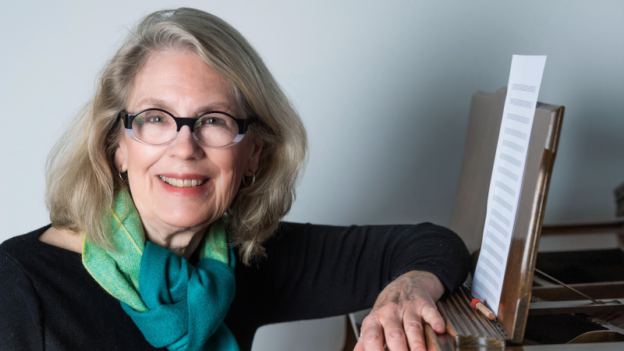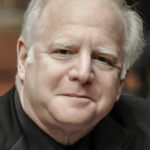Sarah Beaty, mezzo-soprano; Eliesha Nelson, viola; Mari Sato, violin/narrator; Brian Skoog, tenor; Shuai Wang, piano.
Margaret BROUWER: Rhapsodic Sonata
Margaret BROUWER: Declaration
Margaret BROUWER: I Cry – Summer 2020
Margaret BROUWER: The Lake
Margaret BROUWER: All Lines Are Still Busy
Naxos American Classics 8.559904
Release Date: April 8, 2022
Duration: 55:18
Melinda Bargreen | 25 MAY 2022
Music is supposed to be timeless, but it also is inescapably linked with its own time.
Composer Margaret Brouwer achieves both of these states in her new recording of chamber and vocal works, Reactions: Songs and Chamber Music (Naxos American Classics).
Brouwer’s gift for melody, and her ability to weave together contemporary idioms with lines that allow the instruments to sing, make her a composer for whom chamber musicians (and listeners) should be grateful.
Her new recording is a compelling collection of works composed between 2005 and 2020 that could hardly be more timely: one of the new pieces (I Cry – Summer 2020, for viola and piano) references the gloom and the strictures of the Covid pandemic.
Recorded here are Brouwer’s 2016 revision of the 2011 Rhapsodic Sonata, for viola and piano; Declaration, for voice, viola, and piano; I Cry – Summer 2020, for violin and piano; The Lake, for tenor and piano, and a witty “dessert,” All Lines Are Still Busy, for violin/narrator. These works are indeed “Reactions” spurred by events and developments of our time, from the pandemic to the pollution of our waters.
The emotional range of the music is remarkable, spanning passion, despair, and humor; the musical language is modern yet tonal enough to (literally) strike a chord with contemporary listeners.
Beautiful in its timbre and wide in its range, the viola is often overlooked as a solo instrument in favor of the more commonly-heard violin or cello. Brouwer’s three-movement Rhapsodic Sonata, with violist Eliesha Nelson and pianist Shuai Wang, offers substantial challenges for both players.
An edgy, staccato opening statement gives way to a mournful descending melody and into a declarative answer, then back to the more rhythmic opening; the listener is adroitly hooked. Nelson meets the work’s virtuoso requirements with sharp attacks and soulful melodies. The pianist’s part is no mere accompaniment but a demanding, virtuosic partnership. An extended cadenza for viola is both eloquent and challenging. Composer Brouwer makes telling use of the viola’s lowest octave, deploying the instrument’s lowest C as if to ground the listener in that solid, vibrato-less sound.
The slower and more contemplative second movement sometimes finds the violist taking just a little time to find the pitch center of the note in question. The melodic lines take full advantage of the warmth and richness this instrument can command. Again, that low C appears to be a touchstone.
The third movement finds a change of pace with a more playful atmosphere, scampering figures in viola and piano, rhythmic back-and-forth passages, some humor, and energetic exchanges between the two instruments. This substantial and important sonata should find plenty of grateful exponents among those who can handle the technical challenges.
Declaration, a four-movement 2005 work for mezzo-soprano, violin, and piano, features texts by writers ranging from Thomas Jefferson to Brouwer herself, addressing important fundamental issues: violence, war, fairness, and human equality.
Brouwer adroitly scores these songs, introducing musical lines that gradually wrap around each other. The musical language is often angular, particularly for the singer. Most intriguing of all is the final song, “Whom do you call angel now,” with its bleak opening for soprano and viola giving way to a piano entrance with tonal chords, leading on to stark but tonal passages that are different from all the preceding lines. The music gradually rises to a rhapsodic conclusion.
The mezzo-soprano lines are beautifully sung by Sarah Beaty, with Mari Sato, violin, and Shuai Wang, piano.
I Cry – Summer 2020, for piano and violin, opens with contemplative passage that soon turns more emotional. The composer adroitly weaves the piano’s right-hand triplets and pedal tones around the violin’s wide-ranging melody, performed here by Sato with remarkable expressivity. Wang is an adroit partner at the piano. This piece, short but impactful, is a deeply felt response to the Covid pandemic, likely to resonate with many listeners.
The composer wrote the text for The Lake, an attractive piece that carries with it a message about man’s despoiling of nature. The piano’s opening arpeggios mimic birdsong; vocal soloist Brian Skoog (a tenor with a warm sound and a wide range) engages in an agile back-and-forth with pianist Wang. The performance is accomplished, and the diction is clear, without the airbrushed perfection sometimes cultivated in lieder singing. As the music progresses, the ecological message is clear: sewers dumping in the lake, dead fish, sludge. “Why are we so careless?”
Balancing the serious messages of pandemic and ecology, the disc’s finale is a humorous account of an experience we all share: the lengthy telephone holds that build the caller’s frustration. All Lines Are Still Busy has the violinist/narrator Sato “dialing” a line that is eternally busy while the message intones, “Hello! You have reached our automatic answering system!” And then come the lines of that perpetual “on hold” music: the Pachelbel Canon, while the assurance that “All lines are still busy” gets humorous musical answers from Sato as soloist/narrator/actor. This piece may well make a tasty encore for many future violin recitals. ■
External links:
• Margaret Brouwer: margaretbrouwer.com
Melinda Bargreen is a Seattle-based composer and music journalist who has been writing for the Seattle Times and other publications for four decades. Her 2015 book, Classical Seattle is published by University of Washington Press. Her 50 Years of Seattle Opera was published by Marquand Books in 2014.
RECENT POSTS








.png)